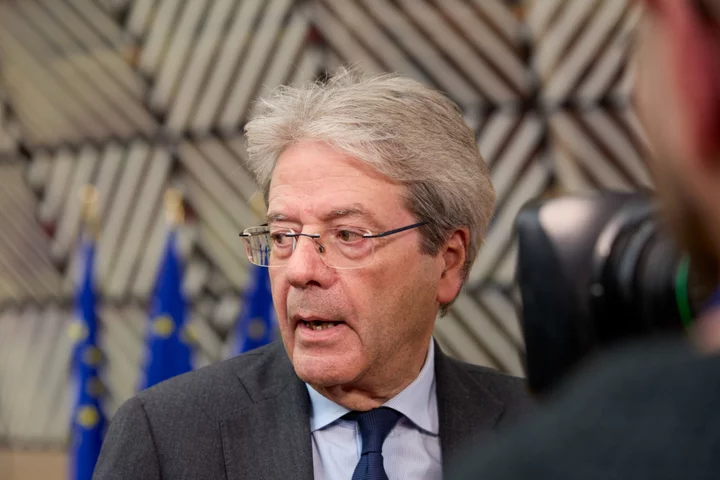European Economy Commissioner Paolo Gentiloni urged governments to set aside rigid positions on the reform of the bloc’s debt rules and seek common ground as the EU tries to reach a deal by the end of the year.
He was speaking after an op-ed was published by Germany and 10 other member states in which they called for stricter fiscal discipline than currently set out in proposals to change the so-called Stability and Growth Pact.
“The commission is working for a solution based on the common interest, not on this or that national position,” Gentiloni told reporters on the sidelines of a meeting of finance ministers in Luxembourg. “Our clear conviction is that this is the time to build bridges and not to dig trenches.”
The pact, which sets limits on budget deficits and debt, was suspended during the Covid-19 pandemic and then again until the end of this year due to Russia’s war in Ukraine. The debate over the reform has highlighted divisions between Germany and its allies who want less flexibility and more dovish colleagues who are concerned excessive pressure to reduce debt quickly could jeopardize economic growth.
The need for progress comes as Europe is battling to bring down surging inflation that has led to an ongoing cycle of monetary tightening, complicating the spending picture for governments that also have to find more money to service their debt.
Binding Rules
The European Commission, the EU’s executive arm, unveiled proposals to reform the fiscal rules in April. German Finance Minister Christian Lindner said significant adjustments were needed to ensure countries with high deficits reduce them. Germany has emphasized it isn’t alone and called on like-minded countries to express their views publicly.
Ahead of the Eurogroup meeting, finance ministers from 11 countries including Germany, Denmark, Austria, the Czech Republic and the Baltic states published a joint opinion piece in European newspapers calling for “reliable, transparent, easily measurable and binding fiscal rules” and “quantitative criteria that apply equally to all member states.”
They oppose the idea that “the time horizon for a necessary consolidation goes far beyond the cycle of a legislative period” as this could lead to Europe being too slow in reacting to new challenges and weaken its global competitiveness. They also reject giving the commission more leeway in negotiating debt-reduction plans with member states.
Other countries consider that the proposals, which include a minimum fiscal adjustment in the case of excessive deficits and a requirement for debt ratios to come down, have already moved in Germany’s direction.
French Finance Minister Bruno Le Maire said the difficulty is to strike a balance between the need to return to healthy public finances while also investing in defense and combating climate change, and he warned against reintroducing automatic, uniform rules.
“Let us not multiply automatic measures, or we risk making the system rigid and putting in jeopardy growth and investment, and thus innovation,” he was quoted as saying by Les Echos newspaper in an interview published on Friday.
Italy is among countries that want spending such as on the switch to green energy to be considered separately when calculating debt.
‘Political Failure’
Dutch counterpart Sigrid Kaag told reporters on Thursday her country shares Germany’s goals on debt reduction and sustainability though she said there should be more space for reform and investment.
“A reversal of our positions toward the old Stability and Growth Pact would to me mean a political failure of our collective because it didn’t work,” Kaag said. “The old stability pact is not effective, many countries are not adhering to it, compliance is a real issue.”
Spanish Economy Minister Nadia Calvino, whose country takes over the EU presidency at the end of the month, said the ongoing discussion among member states was constructive and reiterated that she’s pushing for an agreement by the end of the year.
--With assistance from Kamil Kowalcze and William Horobin.
(Updates with comments from French finance minister starting in 10th paragraph.)

